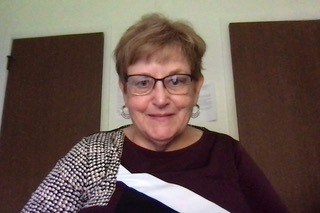
Mary Sheskey was diagnosed with inflammatory breast cancer (IBC) in 2013. IBC is a rare, aggressive and difficult breast cancer to diagnose and treat. It is often not seen on a mammogram because of its rapid onset in between mammograms, and it often spreads throughout the breast or may show up with signs of inflammation.
Mary realized something was amiss when she woke up to find a red, swollen area on her right breast. “It seemingly happened overnight,” Mary recalled. At first, she thought it might be a sebaceous cyst, as she was prone to developing them. But something gnawed at her; this didn’t really seem like a cyst. She knew she needed to see a doctor.
“I did not have health insurance at the time, so I called my doctor to see if I could go in. They said yes, but I had to bring money that I didn’t have, with me,” she said. Mary hung up the phone and immediately started researching programs that could help her navigate getting in to see the doctor.
She turned to a local resource and found out that through Medicaid, she would be able to get into a doctor. As soon as she arrived at her doctor’s appointment, everything happened quickly. “They said it was probably breast cancer,” Mary said. “I was scheduled immediately for tests.”
Mary underwent a mammogram, an ultrasound and a biopsy before it was confirmed that she had stage 3 IBC. Given how difficult IBC can be to diagnose, she’s grateful for how quickly her doctors pinpointed what type of breast cancer she had. Mary underwent eight rounds of chemotherapy, followed by surgeries to remove her right breast and 14 lymph nodes. She then had six weeks of radiation therapy, and is on an oral medication, which she will take for 10 years.
Shortly after completing treatment, at the age of 61, Mary went back to college to get a master’s degree in social work. She was driven to return to school because of her experiences while in treatment. “I wanted to understand more,” she said. “I wanted to understand how to help others through their cancer journeys.”
If someone is newly diagnosed with breast cancer, Mary recommends finding people to lean on. “I’m not married, so it was important to find people who could help me,” she said. “Members of a group I belong to came together and drove me to chemo appointments, they sat with me and kept me company.”
Mary has also spoken at the Ohio Statehouse, sharing her experiences with local representatives. “I hope sharing my story firsthand will make a difference,” she said. “I want to be able to help wherever I am needed.”



